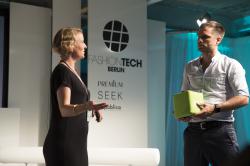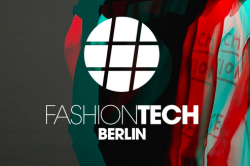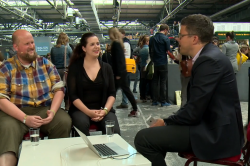20150120_fashiontech_009.jpg

Fashion and technology – these two are still often seen as an unlikely couple. But the first collaboration of re:publica with the international fashion trade shows PREMIUM and SEEK within the Berlin Fashion Week has shown that many new opportunities await us here. With more than 1,200 attendees who came to the Glashaus at Arena Berlin on January 20, our Wearables conference was a great success! #FASHIONTECH BERLIN is a one-day conference all about fashion, technology and Wearables, combining gadgets, hacking and design.

The conference included workshops and an exhibition featuring, among other, handcrafted LED jackets by cyclist group Trafo Pop who make them for their night rides through Berlin.
Among many others, Fabian Hemmert of the Design Research Lab at the Berlin University of the Arts spoke about textile innovations in his keynote address. He presented a sensor-equipped glove, for instance, that parses and formulates texts for deaf and blind users. For Hemmert, it’s not about the gimmicks as such, but about a whole new field of possibilities for the future. Take the idea of an emergency button for stroke patients, for example, which could be directly integrated into patients’ clothing, say into a cardigan or sweater. So if patients grip their chest, an emergency call is triggered via Bluetooth.
Amy Congdon also presented some intriguing insights from her work: she has developed new materials from bacteria, for example. The British design researcher has made earrings out of skin and bone cells, and decorative dorsal applications from fungi. Even if many aspects are currently still unthinkable, and also raise ethical questions, this could prove to be a model for the textile industry of the future.

Mareike Nieberding talked about how the app Instagram changes the way the fashion industry presents itself.
The session with Mareike Nieberding on how the mobile app Instagram is transforming the fashion industry also met with great interest. She spoke of an ongoing revolution in fashion, instigated through social media channels. These have by now become essential for the business, not only because they force companies to open up their fashion shows, to bloggers for example, but also because designers have to think about presenting their fashion in 2D online in new ways.
Wearables for everyone? This is the proclaimed goal of Lisa Lang, founder of an agency for Wearables, ElektroCouture. For her, it is important to create portable designs at the intersection of fashion and technology. Technology should be invisible in Wearables, in order to reach the mainstream, she says. And technical features are best combined with aesthetic elements. She also hopes for more collaboration between the two fields. During the conference, she spoke about her experiences in the FabLab and how inspiring she found the numerous possibilities to do-it-yourself. And it’s the laser cutter in particular that she is really taken by. For Lang, laser cutters are the new sewing machines, offering numerous possibilities. Her appeal: more fashion designers should get together with techies in FabLabs for mutual exchange and support. New and individual designs and patterns could be created so much faster.

Lisa Lang founded an agency for bespoke wearables technologies, ElectroCouture. She stressed the intersection of fashion and technology and talked about how designers should make use of the Berlin-based FabLabs for their creations more often.

LED dress fabricated by Lisa Lang.
The first #FASHIONTECH BERLIN kicked off successfully, showcasing a colourful mixture of fashion, design and technology. It is important to highlight the overlaps between these fields and foster new partnerships, innovative projects, current trends and ways of working, be it fungus cultures, sensor gloves or just a change in attitude among fashion designers. The bottom line is that there is a lively community that continues to probe this new field, which also holds some great opportunities for Berlin as a creative hub. A young, experimental mindset, combined with the local tech scene, could well benefit the German capital as a location for this new area of fashion.
To be continued...
#FASHIONTECH BERLIN was only the beginning! So if you missed the conference, you can look forward to its sequel: The topic will be explored in a special track of its own at re:publica 2015. So just as a last reminder, hurry up and join our Call For Papers: Technology & Wearables before January 31, 2015. In addition, there will be another #FASHIONTECH BERLIN within the next Berlin Fashion Week in July 2015.

After the inspiring talks the fashion crowd gathered for networking – and drinks.

Sponsors like Audi made this event happen. If you would like to become a partner for our next Wearable track at re:publica 2015, feel free to contact us for further info.
Media Echo
Fashion of the Future
"This is what the future of fashion could look like, if it’s made by creative, techies and scientists all at once."
Sueddeutsche.de
Custom-Made Technology
"Laser cutters are the new sewing machines – but most fashion designers don’t know it yet."
heise.de
This Is What the Future of Fashion and Technology Looks Like
"LED waistcoats and evening gowns are being transformed into screens for Twitter updates – and jewelry will display your missed calls."
WIRED.de
Are Regrowing Materials and 3D Printed Rings the New Black?
"Innovative designers should realize their ideas through Crowdfunding campaigns."
Gruenderszene.de
Kick-Off for the Digital Future of Fashion
"For the first time, designers, electronics geeks and creative met up during the Berlin Fashion Week at the Fashiontech conference, to revisit the intersections of fashion and technology."
N24.de



